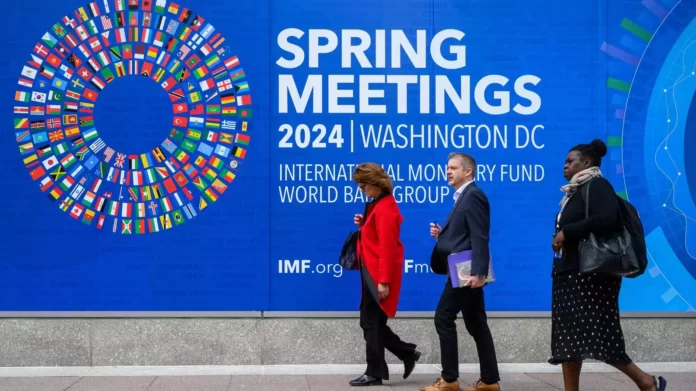At the recent International Monetary Fund (IMF) and World Bank Spring Meetings in Washington, global finance leaders sought clarity on the economic impact of President Donald Trump’s aggressive tariff policies. However, many left with more questions than answers.
The U.S. administration’s tariff strategies, including a 25% levy on imports of vehicles, steel, and aluminum, and 10% on other goods, have created significant concerns. Despite receiving 18 written proposals and holding numerous negotiations, no concrete agreements were reached, and talks remained largely inconclusive.
Polish Finance Minister Andrzej Domanski expressed concerns over the uncertainty these tariffs have generated, describing the situation as detrimental to both the U.S. and global economies. The IMF, while acknowledging the risks, refrained from forecasting recessions but noted the trade disruptions would lead to slower growth.
Reza Baqir, former governor of Pakistan’s central bank and now head of sovereign debt advisory at Alvarez & Marsal, highlighted growing concerns among developing countries, particularly in the Global South. Baqir emphasized the lack of focus on the “Financing for Development” agenda, noting that tariffs have caused a slowdown in crucial foreign trade and investments needed for economic growth in emerging markets.
The IMF’s Managing Director Kristalina Georgieva maintained a cautiously optimistic stance, noting that while the uncertainty was detrimental to global business, ongoing trade negotiations offered hope for easing tariff pressures.
Meanwhile, the IMF and World Bank continued to face challenges related to rising debt levels in emerging markets, exacerbated by the trade slowdown. World Bank Chief Economist Indermit Gill called attention to the growing debt risks and the need for developing nations to cut their own tariffs to boost growth prospects.
While U.S. Treasury Secretary Scott Bessent reaffirmed support for the IMF and the World Bank, his comments about refocusing these institutions on economic stability, rather than climate and gender issues, raised eyebrows. Bessent also indicated that the Trump administration believed the current tariff wars with China were unsustainable, hinting at a potential resolution.
However, China’s denial of ongoing tariff negotiations with the U.S. further complicated the situation, adding to the confusion and uncertainty among global leaders.
Despite some relief over Bessent’s remarks, analysts, including former IMF adviser Josh Lipsky, expressed concern that the global economic situation could worsen. Lipsky also warned that the recent selloff in U.S. Treasury debt and other dollar-based assets signaled eroding trust in U.S. economic policies, a situation that could encourage trading partners to seek alternatives to the dollar in the future.
As the global economy grapples with these uncertainties, the path forward remains unclear, with finance leaders and market participants bracing for further challenges.




